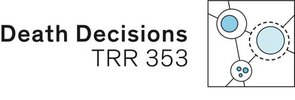Death Decisions IRTG Qualification Program
Lecture series
This series will provide fundamental teaching on the signaling pathways of different cell death modalities, state-of-the-art techniques of cell death detection, and the distinction of the different cell death modalities and related signalling pathways in different biological systems. Moreover, the Death Decisions IRTG will offer lectures on large scale data generation and analysis which will enable participants to integrate -omics and system analyses.
Lectures will be held by the TRR 353 project leaders. Recorded lectures will be provided via the TUM teaching platform Moodle and Panopto.
These lectures are mandatory for TRR 353 doctoral researchers.
Scientific Workshops
- Bioinformatics: Prof. Melanie Börries (SP02, University of Freiburg) will offer for the members of the Death Decisions-IRTG a bioinformatic workshop that gives an overview about analysis strategies and tools for the analysis of high-throughput data. This workshop will be broadcasted.
- Proteomics: This two-day workshop will be held by Dr. Julia Mergner (SP01, Technical University of Munich) and will take place on-site at Technical University of Munich. The workshop will provide a basic introduction into mass spectrometry-based quantitative proteomics and discuss measurement options and necessary considerations for a successful project outcome. Here you can find information about the upcoming Proteomics Workshop 2024.
Transferable skills workshops
The aim of these workshops is to qualify doctoral researchers for careers in and outside academia. These workshops will be organized during the doctoral retreats (one per year).
- Networking skill: how to enhance overall effective communication (verbal and non-verbal) to improve networking and self-marketing opportunities. How vocal quality, body language and verbal expression can be best used in academic and professional contexts.
- Public speaking – How to engage the listener: participants will learn how to concisely introduce themselves and practice their “pitch”, how to engage the audience in their talk, affirm their strengths and individual speaking style, improve body language and develop strong tactics for effective communication.
- Career planning: strategies and approaches to set career vision, goals, and action plans. Students will learn how to apply career models and tools for successful career planning and management, and to design a career path that fits personal values, interests, personality, and skills.
Seminar series
These are regular talks (4-5 seminars per semester) given by national and international scientists who cover state-of-the-art research in the field of cell death and related areas. These seminars will provide the IRTG fellows and all other TRR 353 members with the newest up-to-date progress in this research field and opportunities for networking with high-profile scientists.
The seminars will be held physically at one of the applying universities, with regular rotations, but will also be streamed online to the other participating institutions.
IRTG doctoral researchers have to attend a minimum of 75% of these seminars per year. They will receive a certificate of participation providing credits recognized by the local graduate schools.
Don´t miss the next seminar!
Prof. Hans Zischka: Mitochondrial Toxicology in Wilson Disease, 14 March 2024.
Career webinars
During these webinars, successful scientists working in the industrial sector as well as in academia will report their career paths, the challenges associated with a competitive work environment, and tips for successful professional development. Senior postdoctoral researcher, junior group leaders, and Tenure-Track professors will present job opportunities within academia. Scientists working in Biotech, BioMed, and Pharma companies as well as editors of scientific journals will be invited to share their experiences and give advice on career paths outside academia.
Scientific Missions
Doctoral researchers of the consortium have the opportunity to visit collaborating research groups to learn new techniques, generate scientific data with tools, reagents and instrumentation not available at the home institution and deepen their scientific contacts. There is no prefixed duration for Scientific Missions, they can vary from days to months according to the specific scientific need. Interested doctoral researchers can contact and apply to the IRTG Office. Projects will be evaluated based on scientific quality, value for the project and promotion of the overall interactions within the TRR 353.
Doctoral researchers´ Zoom reunion (every two months)
Doctoral researchers will meet every two months via ZOOM.
This is a free space for you to ask for a protocol, discuss some data, present the latest paper published. You can present a progress report - make it short, coherent and understandable to all other doctoral researchers regardless of their own research area - or can practice an important presentation in a friendly environment. You can also have a coffee and talk about how is going!

